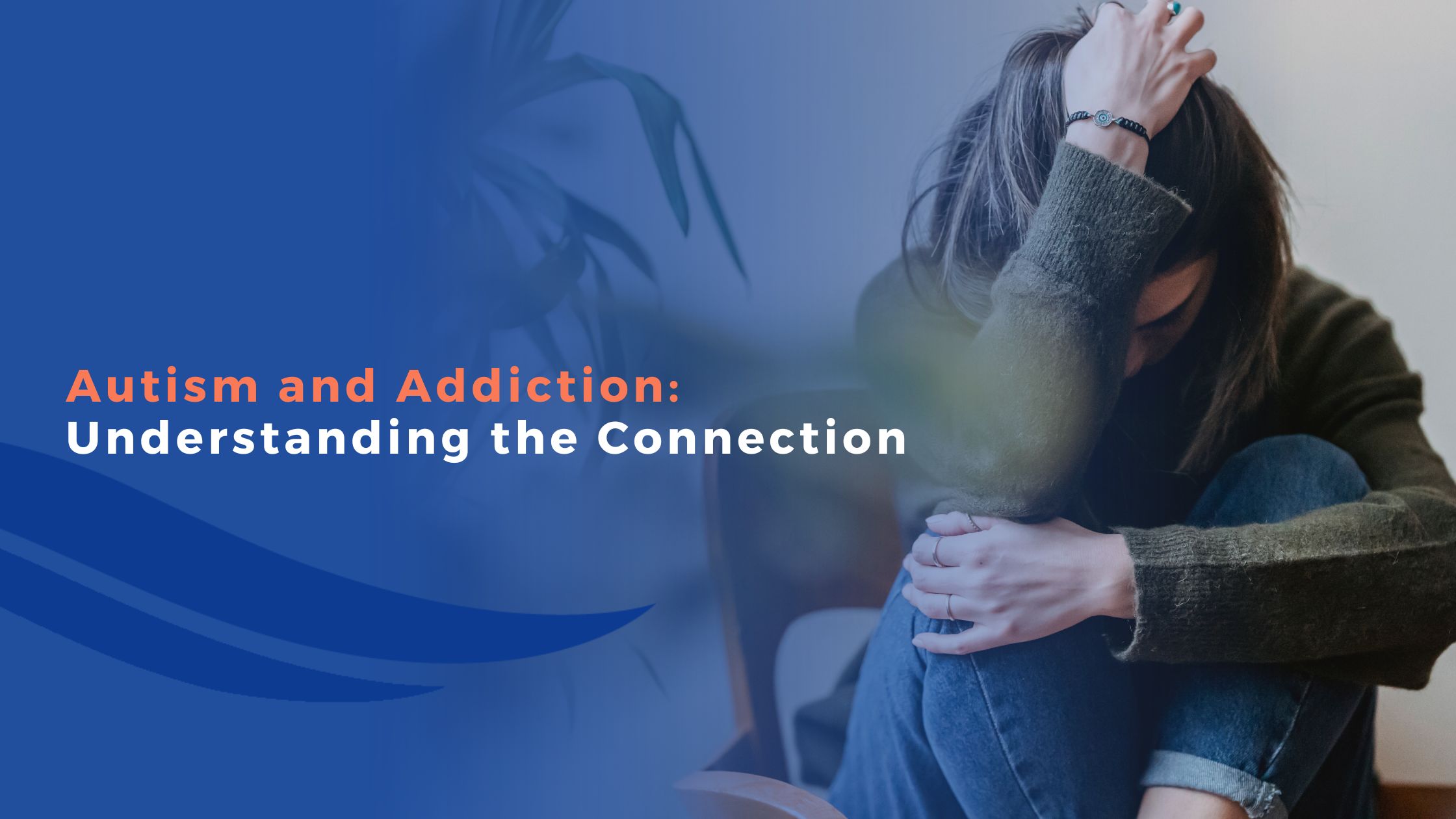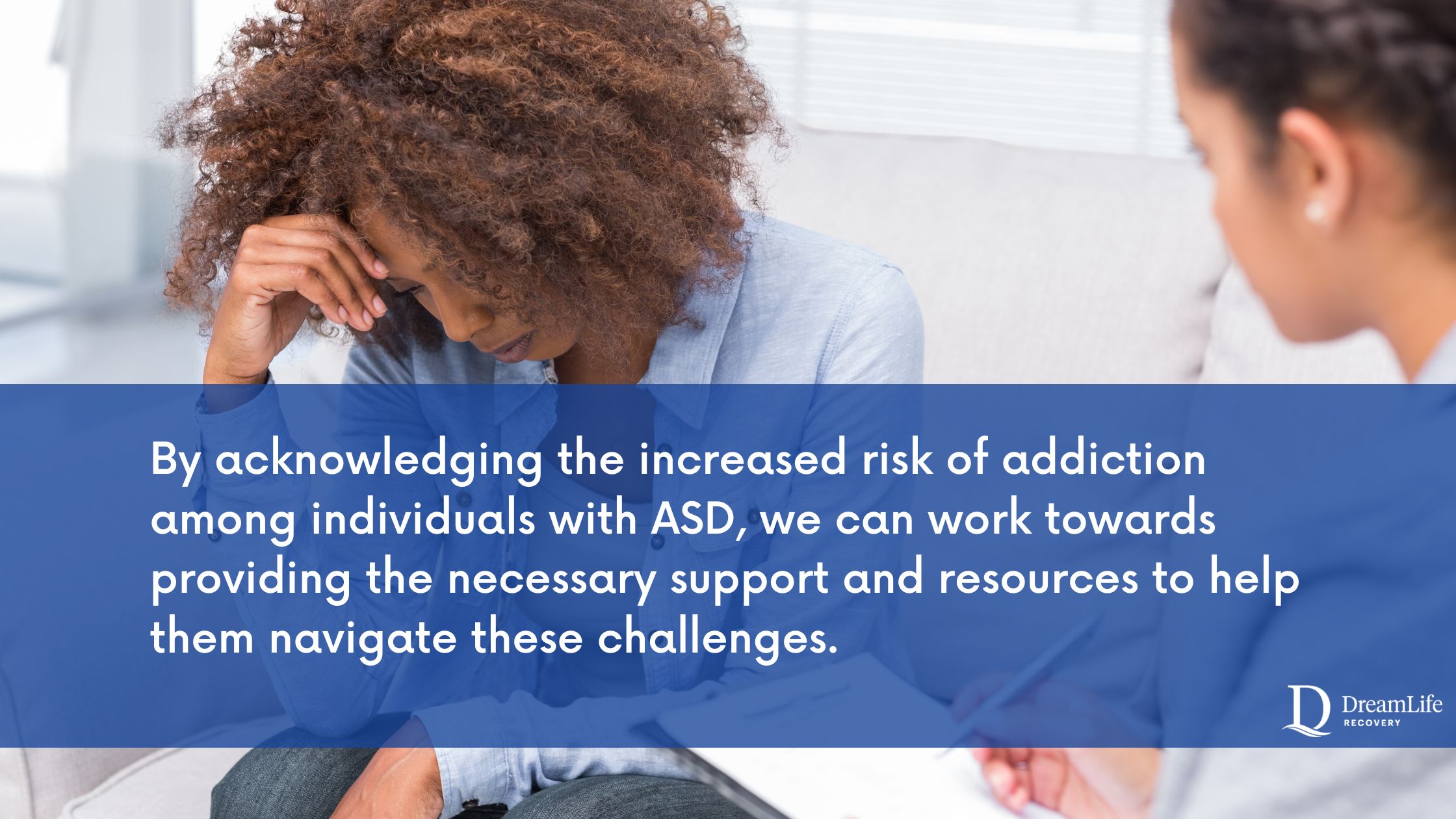Autism and Addiction: Understanding the Connection


Written By
DreamLife RecoveryNavigating the world of Autism Spectrum Disorder (ASD) can be complex, but when coupled with addiction, it becomes an intricate labyrinth that requires a deeper understanding. This is the reality for many individuals and their families when grappling with these dual diagnoses.
In this blog post, we will explore the often-overlooked connection between autism and addiction. We’ll delve into the factors contributing to this correlation, aiming to paint a broader picture of these intertwined conditions.
Our objective is to enhance understanding and provide support and resources for those living this reality. Let’s embark on this journey together, unraveling the complexities of autism and addiction.
Understanding Autism Spectrum Disorder (ASD)
Autism Spectrum Disorder is a complex, lifelong developmental disability that manifests during early childhood. It affects how individuals perceive the world, communicate with others, and interact with their surroundings.
ASD is characterized by a spectrum, indicating a wide range of symptoms and levels of impairment that can vary greatly from person to person. This variability makes it challenging to provide a one-size-fits-all definition, but there are common signs and characteristics.
Individuals with ASD often struggle with social interaction and communication. They might have difficulty understanding other people’s emotions or expressing their own. They may also avoid eye contact, have trouble conversing, or use repetitive language.
Behavioral challenges are another key feature of ASD. People with autism may engage in repetitive behaviors, such as hand-flapping, rocking, or insistence on routines. They may also have narrow, intense interests in specific subjects.
Additionally, sensory issues are common in individuals with ASD. They may be overly sensitive to certain sounds, textures, tastes, or smells, or conversely, they may seek out specific sensory experiences.
Understanding ASD is crucial, not just for those diagnosed with it, but for everyone, as this fosters empathy, compassion, and inclusivity.
The Connection Between Autism and Addiction
People with autism may be more susceptible to drug and alcohol addiction due to several factors. Firstly, individuals with ASD often experience heightened levels of stress and anxiety. Drugs and alcohol can offer a temporary escape from these feelings, making them appealing coping mechanisms.
Secondly, the social challenges associated with ASD might contribute to substance use. Difficulty understanding social cues and forming meaningful relationships can lead to feelings of isolation and loneliness. Substance use might be seen as a way to fit in or connect with others.
Finally, people with autism often have rigid and repetitive behaviors, which is a trait that aligns with addictive behaviors. Once a pattern of substance use is established, it can be particularly challenging for an individual with ASD to break free from it.
Understanding this connection is crucial for developing effective prevention and treatment strategies. By acknowledging the increased risk of addiction among individuals with ASD, we can work towards providing the necessary support and resources to help them navigate these challenges.


Challenges in Diagnosis and Treatment
Having established the link between ASD and addiction, it is important that we also discuss the challenges in diagnosing and treating addiction in people with autism.
Diagnosing Addiction in Individuals with Autism
Diagnosing addiction in individuals with Autism can be particularly challenging due to overlapping symptoms and communication difficulties. For example, social withdrawal is common in both ASD and addiction, making it difficult to determine whether changes in behavior are due to worsening autism symptoms or the onset of substance use.
Additionally, individuals with ASD may struggle to communicate their experiences, feelings, and behaviors, which are critical elements for diagnosing addiction. This may result in underdiagnosis or misdiagnosis of addiction in this population.
Treating Addiction in Individuals with Autism
When it comes to treating addiction in individuals with ASD, several complexities arise. Firstly, traditional addiction treatment programs often rely on group therapy and social interaction, which can be challenging for individuals with autism due to their inherent social communication difficulties.
Secondly, individuals with ASD often have co-occurring mental health issues such as anxiety and depression. These conditions can complicate addiction treatment and must be addressed concurrently for successful recovery.
Finally, people with autism may require adaptations to standard treatment approaches to accommodate their unique needs and learning styles. For instance, they might benefit from more visual aids, concrete examples, and repetition in their treatment program.
Understanding and addressing these challenges are crucial steps in providing effective care to individuals with ASD struggling with addiction.
Strategies for Support and Management
Addressing addiction in individuals with Autism requires a multi-faceted approach that considers the unique needs and challenges discussed above. Here are some effective strategies:
- Individual Therapy: One-on-one sessions with a therapist who understands both ASD and addiction can be beneficial. This allows for personalized addiction treatment plans that address the individual’s specific needs and challenges.
- Cognitive Behavioral Therapy (CBT): CBT has been shown to be effective in treating addiction. It can be adapted to help individuals with ASD understand and manage their addictive behaviors.
- Family Involvement: The support of family members is crucial in managing addiction. Family therapy can provide education about addiction and ASD, as well as strategies to support the individual at home.
- Medication: In some cases, healthcare providers may use medication to manage co-occurring mental health conditions or to reduce cravings for substances.
- Support Groups: Support groups specifically for individuals with ASD and addiction can provide peer support and shared understanding.
- Educational Programs: Programs that educate individuals with ASD about the dangers of substance use can be preventative.
These strategies and resources, when implemented effectively, can offer much-needed support to individuals with ASD struggling with addiction.
Get Addiction Treatment at DreamLife Recovery Today
Understanding the connection between autism and addiction is the first step in providing effective support. If you or a loved one has Autism Spectrum Disorder and is struggling with addiction, remember that help is available.
At DreamLife Recovery, our compassionate professionals have the knowledge and tools to address this complex intersection. We encourage you to take the first step towards recovery today. Call us at (855) 384-5808 or fill out this contact form to start your journey towards healing and regain control of your life. You are not alone; allow us to walk this path with you.







